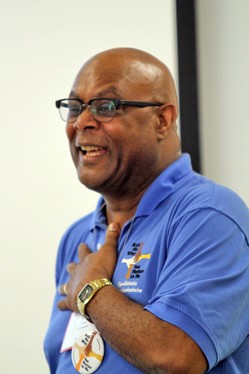As our nation grows increasingly diverse, the way the church engages in ministry must also evolve. In an effort to meet the ever-changing needs of the changing church, Racial Ethnic & Women’s Ministries unveiled a new office—the Office of Intercultural Ministries—at Big Tent 2015, held this week in Knoxville, Tenn.
Intercultural ministry is an intentional approach to develop and strengthen diverse relationships that foster comprehensive mutuality, reciprocity and equality. This ministry focuses on relationship building and forming compassionate connections in which people are transformed, shaped and molded from one another’s experiences and racial and cultural power imbalances are addresses.
The Office of Intercultural Ministries in Racial Ethnic & Women’s Ministries will engage the church in an effort to become truly intercultural and to practice cultural humility as the church seeks to develop deeper relationships that cross barriers of race, ethnicity and class to better reflect and engage in communities around us. The office will:
- Work with mid-councils and congregations as they develop strategies and coordinate efforts to engage in intercultural ministry;
- Connect leaders from across the Presbyterian Church (U.S.A.) who are interested in intercultural ministry through conferences and events;
- Provide training and resources for pastors and other church leaders on ways to better understand and engage in intercultural ministry.
“Growing an intercultural ministry or developing intercultural relationships is much like growing a tree,” says Sterling Morse, coordinator for the Office of Intercultural Ministries. “You don’t just plant a seed and leave it be. That seed needs to be nurtured so roots develop and the seed begins to flourish and grow.”
During his workshop at Big Tent 2015, Morse focused on addressing ways individuals and congregations can work toward building intercultural relationships and prevent roots of bitterness from developing in the midst of change.
“Intercultural ministries are messy,” he says. “Any time you get deep enough to see and understand people’s problems and drama, things get a little messy. But that’s what God has called us to do and we need to be willing to get messy—to work through the mess—in order to build those deeper relationships.”
Morse says these relationships are the key to having meaningful and sustained intercultural ministries.
“In intercultural communities where we live alongside one another and learn and grow from one another’s experiences,” he says. “In the past, we’ve done work in developing cross-cultural relationships and ministry, where there is some reaching across boundaries, but we don’t necessarily develop deep and meaningful relationships.”
“With this office, we’ll focus on taking that cross-cultural work to the next level,” asserts Morse. “In my years of ministry, I’ve learned that the people in the pews have not much more than surface knowledge of those who sit around them. This office aims to help change that and provide resources and support for deepening relationships across all boundaries.”
To learn more about the work of the Office of Intercultural Ministries, visit www.pcusa.org/intercultural.

